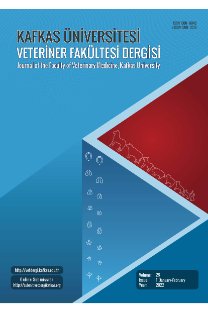The effects of Genistein on the cockerel testis during embryonic development
horoz, embriyonik gelişim, genistein, eşey hücreleri, testis
Genisteinin embriyonik gelişim sırasında civciv testisleri üzerine etkisi
cocks, embryonic development, genistein, germ cells, testes,
___
- Atanassova N, McKinnell C, Turner KJ, Walker M, Fisher JS, Morley M, Millar MR, Groome NP, Sharpe RM: Comparative effects of neonatal exposure of male rats to potent and weak (environmental) estrogens on spermato-genesis at puberty and the relationship to adult testis size and fertility: Evidence for stimulatory effects of low estrogen levels. Endocrinology, 141, 3898-3907, 2000.
- Murkies AL, Wilcox G, Davis SR: Clinical review 92: Phytoestrogens. J Clin Endocrinol Metab, 83, 297-303, 1998.
- Reinli K, Block G: Phytoestrogen content of foods-A compendium of literature values. Nutr Cancer, 26, 123-148,1996.
- Kuiper GG, Carlsson B, Grandien K, Enmark E, Haggblad J, Nilsson S, Gustafsson JA: Comparison of the ligand binding specificity and transcript tissue distribution of estrogen receptors alpha and beta. Endocrinology, 138, 863-870, 1997.
- Morito K, Hirose T, Kinjo J, Hirakawa T, Okawa M, Nohara T, Ogawa S, Inoue S, Muramatsu M, Masamune Y: Interaction of phytoestrogens with estrogen receptors alpha and beta. Biol Pharm Bull, 24, 351-356, 2001.
- Atanassova N, McKinnell C, Walker M, Turner KJ, Fisher JS, Morley M, Millar MR, Groome NP, Sharpe RM: Permanent effects of neonatal estrogen exposure in rats on reproductive hormone levels, Sertoli cell number, and the efficiency of spermatogenesis in adulthood. Endocrinology, 140, 5364-5373,1999.
- Sharpe RM, McKinnell C, Kivlin C, Fisher JS: Proliferation and functional maturation of Sertoli cells, and their relevance to disorders of testis function in adulthood. Reproduction, 125, 769-784, 2003.
- Atanassova NN, Walker M, McKinnell C, Fisher JS, Sharpe RM: Evidence that androgens and oestrogens, as well as folliclestimulating hormone, can alter Sertoli cell number in the neonatal rat. J Endocrinol, 184, 107-117, 2005.
- Adachi T, Ono Y, Koh KB, Takashima K, Tainaka H, Matsuno Y, Nakagawa S, Todaka E, Sakurai K, Fukata H, Iguchi T, Komiyama M, Mori C: Long-term alteration of gene expression without morphological change in testis after neonatal exposure to genistein in mice: Toxicogenomic analysis using cDNA microarray. Food Chem Toxicol, 42, 445-452, 2004.
- Kirby JB, Froman DP: Reproduction in male Brids, In, Whitt GC (Ed): Sturkie’s Avian Physiology 5th ed, 597-615, Academic Press, New York.1999.
- Bozkurt HH, Aktas A, Ulkay MB, Firat UB: Sertoli cell proliferation during the post hatching period in domestic fowl. J Vet Sci, 8, 219-222, 2007.
- Fielden MR, Samy SM, Chou KC, Zacharewski TR: Effect of human dietary exposure levels of genistein during gestation and lactation on long-term reproductive development and sperm quality in mice. Food Chem Toxicol, 41, 447-454, 2003.
- Kang KS, Che JH , Lee YS: Lack of adverse effects in the F1 offspring maternally exposed to genistein at human intake dose level. Food Chem Toxicol, 40, 43-51, 2002.
- Kula K: Induction of precocious maturation of spermato-genesis in infant rats by human menopausal gonadotropin and inhibition by simultaneous administration of gonado-tropins and testosterone. Endocrinology, 122, 34-39, 1988.
- Kula K, Slowikowska-Hilczer J, Romer TE, Metera M, Jankowska J: Precocious maturation of the testis associated with excessive secretion of estradiol and testosterone by Leydig cells. Pediatr Pol, 71, 269-273, 1996.
- Slowikowska-Hilczer J, Kula K: Comparison between the influence of estradiol benzoate, testosterone propionate and human chorionic gonadotropin on initiation of spermatogenesis in the rat. Ginekol Pol, 65, 53-57, 1994.
- Smith CA, Andrews JE, Sinclair AH: Gonadal sex differentiation in chicken embryos: expression of estrogen receptor and aromatase genes. J Steroid Biochem Mol Biol, 60, 295-302,1997.
- Nakabayashi O, Kikuchi H, Kikuchi T, Mizuno S: Differential expression of genes for aromatase and estrogen receptor during the gonadal development in chicken embryos. J Mol Endocrinol, 20, 193-202, 1998.
- Stevens L: Sex chromosomes and sex determining mechanisms in birds. Sci Prog, 80 , 197-216, 1997.
- Scheib D, Guichard A, Mignot TM, Cedard L: Steroido-genesis by gonads of normal and of diethylstilbestrol-treated quail embryos: radioimmunoassays on organ cultures. Gen Comp Endocrinol, 43, 519-526, 1981.
- Berg C, Halldin K, Brunstrom B: Effects of bisphenol A and tetrabromobisphenol A on sex organ development in quail and chicken embryos. Environ Toxicol Chem, 20, 2836-2840, 2001.
- Lin F, Wu J, Abdelnabi MA, Ottinger MA, Giusti MM: Effects of dose and glycosylation on the transfer of genistein into the eggs of the Japanese quail (Coturnix japonica). J Agric Food Chem, 52, 2397-2403, 2004.
- Opalka M, Kaminska B, Ciereszko R, Dusza L: Genistein affects testosterone secretion by Leydig cells in roosters (Gallus gallus domesticus). Reprod Biol, 4, 185-193, 2004.
- Leopold AS, Erwin M, Oh J, Browning B: Phytoestrogens: adverse effects on reproduction in California quail. Science, 191, 98-100,1976.
- ISSN: 1300-6045
- Yayın Aralığı: 6
- Başlangıç: 1995
- Yayıncı: Kafkas Üniv. Veteriner Fak.
Neonatal kuzularda pnömoni: yaygınlığı ve etki eden kimi risk faktörleri
Seasonal changes of serum leptin, triiodothyronine, and thyroxine levels in Arabian mares
ÇİĞDEM ALTINSAAT, Aykut Göktürk ÜNER, Nesrin SULU
The effect of Trifolium pratense L. (Red Clover) on rat testes
M.Başak ULKAY, ABİT AKTAŞ, H. Hakan BOZKURT
Bazı Batı Anadolu Triturus türleri (Salamandridae, Urodela) üzerinde sitogenetik bir çalışma
Feyzan Özdal KURT, SERDAR KOCA
Protective effects of L-carnitine on doxorubicine induced cardiomyopathy in rabbits
MEHMET ÇİTİL, HİDAYET METİN ERDOĞAN, Edoğan UZLU, EMİNE ATAKİŞİ, VEHBİ GÜNEŞ, MEHMET TUZCU, METEHAN UZUN, ABDULLAH DOĞAN
METEHAN UZUN, MEHMET ÇİTİL, ONUR ATAKİŞİ, Edoğan UZLU, Kürşat YAPAR, HİDAYET METİN ERDOĞAN
ONUR ATAKİŞİ, SENA ÇENESİZ, AYLA ÖZCAN, EMİNE ATAKİŞİ, Dilek Aksu ELMALI, Ahmet ÖNCÜER
Veysel AYHAN, İbrahim DİLER, Muhammet ARABACI, Hüseyin SEVGİLİ
The effects of Genistein on the cockerel testis during embryonic development
